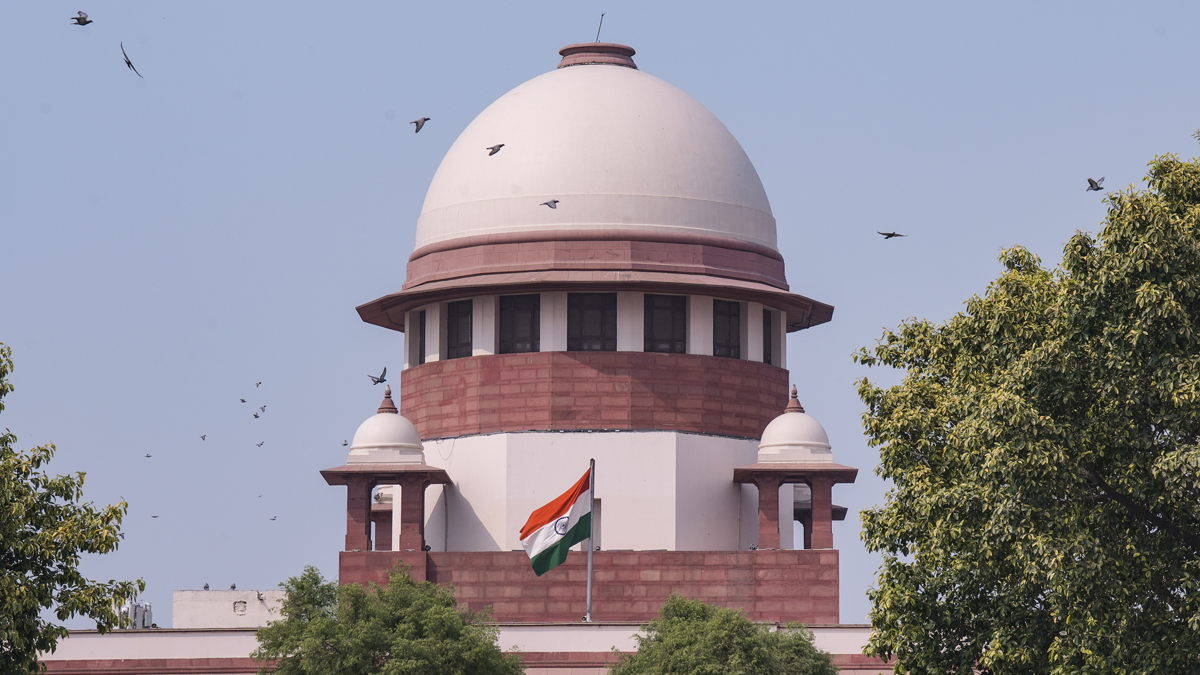Telangana defection: SC draws line on Speaker’s inaction, cites danger of prolonged delays
 New Delhi: View of the Supreme Court of India, in New Delhi, Wednesday, April 16, 2025. The apex court has begun hearing on a batch of petitions challenging the constitutional validity of the Waqf (Amendment) Act, 2025. (PTI Photo/Manvender Vashist Lav)(PTI04_16_2025_RPT222B)
New Delhi: View of the Supreme Court of India, in New Delhi, Wednesday, April 16, 2025. The apex court has begun hearing on a batch of petitions challenging the constitutional validity of the Waqf (Amendment) Act, 2025. (PTI Photo/Manvender Vashist Lav)(PTI04_16_2025_RPT222B)
In a significant assertion of judicial oversight over legislative inaction, the Supreme Court on Thursday set a three-month deadline for the Telangana Assembly Speaker to decide on the disqualification of three MLAs accused of defection.
The judgment delivered by a bench of Chief Justice of India B R Gavai and Justice Augustine George Masih said, “Parliament should review the present mechanism for disqualification of MLAs under anti-defection law as speakers of Assemblies routinely inordinately delay such proceedings to frustrate action against defectors who pose danger to democracy.”
The top court says that parliament has entrusted the adjudication of disqualification pleas against MPs/MLAs to speakers to avoid inordinate delay in such matters if adjudicated by courts. But experience over the years shows that such proceedings drag on for years, rendering it meaningless.
“Though we do not possess any advisory jurisdiction, it is for the Parliament to consider whether the mechanism of entrusting the Speaker/Chairman with the important task of deciding the issue of disqualification on the ground of defection is serving the purpose of effectively combating political defections or not. If the very foundation of our democracy and the principles that sustain it are to be safeguarded, it is to be examined whether the present mechanism is sufficient or not. At the cost of repetition, we observe that it is for the Parliament to take a call on that,” the 74-page judgement reads.
The judgment came on pleas filed by Bharat Rashtra Samithi (BRS) leaders and a BJP MLA, challenging the Speaker’s prolonged inaction on disqualification pleas against Venkata Rao Tellam, Kadiyam Srihari, and Danam Nagender, three legislators who crossed over to the Congress after being elected on BRS tickets.
The case journeyed through multiple judicial layers. It began with a September 2024 order by Justice B Vijaysen Reddy of the Telangana High Court, who directed the Assembly Secretary to place the disqualification pleas before the Speaker and urged a time-bound decision. The judge even warned of a suo motu revival of proceedings if there was further delay.
However, this urgency was diluted by a Division Bench of the High Court, which in November 2024 quashed the single judge's order and requested the Speaker to act within a reasonable time frame.
The Court pointed out that no notice had been issued on the disqualification pleas for over seven months, a delay it said cannot be considered expeditious by any stretch.
It noted that Speakers act as quasi-judicial authorities under the Tenth Schedule and do not enjoy constitutional immunity while doing so. The Court also reminded that in Kihoto Hollohan, a landmark judgment, judicial review of the Speaker's decisions was permitted in a limited manner, especially when there is inaction.
SC bars MLAs from delaying proceedings
The Court also barred the MLAs from trying to delay proceedings further and said an adverse inference may be drawn if they attempt to do so.
The bench observed that unchecked political defections could disrupt democratic functioning. Delays in disqualification often allow defectors to enjoy the benefits of office while their legitimacy hangs in limbo.
By fixing a deadline and warning against deliberate stalling, the Supreme Court seems to be sending a clear signal to constitutional functionaries that discretion cannot be a cloak for inaction.
Implications of the SC judgment
The judgment has national implications beyond Telangana. As the political churn intensifies before the 2029 general elections, similar cases of defection and delay in adjudication may arise in other states. This verdict could serve as a template, tightening the procedural leash on Speakers who defer decisions indefinitely, often under political pressure.
Moreover, the ruling may open the door for future constitutional scrutiny of whether the Speaker should be the sole arbiter in disqualification matters.
India